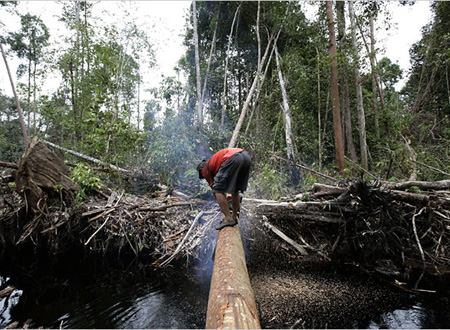Forest loss in Sumatra becomes a global issue
Updated: 2007-12-06 16:20
|
|
Even more significant, the burning and drying of Riau's carbon-rich peatlands, also to make way for palm oil plantations, releases about 1.8 billion tons of greenhouse gases a year, according to Greenpeace officials.
But it is also in Riau that a new global strategy for conserving forests in developing countries might begin. A small area of Riau's remaining forest will become a test case if an international carbon-trading plan called REDD is adopted.
REDD, or Reducing Emissions from Deforestation and Forest Degradation, is to be one of the central topics of discussion at the Bali conference. Essentially, it would involve payments by wealthy countries to developing countries for every hectare of forest they do not cut down.
Indonesia, caught between its own financial interest in the palm oil industry and the growing international demands for conservation, has been promoting the carbon-trading plan for months.
But there are plenty of skeptics, who doubt it will be possible to measure just how much carbon is being conserved -- and who question whether the lands involved can be protected from illegal logging and corruption.
Illegal logging is commonplace in Indonesia, and though the government has prosecuted dozens of cases in recent years, it says it cannot be everywhere. Companies in this remote area are cultivating land legally sold to them by the Indonesian government, but maps of their projects obtained by Greenpeace indicate that many of them have also moved into protected areas.
Critics say corruption is their biggest concern. The most famous illegal logger in Indonesia, Adelin Lis, who operated in North Sumatra, was arrested this year, only to be acquitted by a court in Medan, the provincial capital. He then left the country.
At the Bali conference, the Woods Hole Research Center, an environmental group based in the United States, has presented research showing that new satellite technology can make it more feasible to track illegal logging. Reports "show that radar imagery from new sensors recently placed in orbit can solve the problem of monitoring reductions in tropical deforestation, which previously was a major obstacle because of cloud cover that optical sensors can't see through," said John P. Holdren, the center's director.
Such developments are good news to Mr. Helman, the villager in Riau who, using his wooden boat, has been ferrying a steady stream of foreign environmentalists and journalists in and out of the forest in recent weeks.
"I am so thankful for the recent attention," he said, tinkering with the sputtering engine. "At times it seems too late. But I see some hope now."
|
|
|
||
|
||
|
|
|
|


